Electricity rates would remain unchanged at NT$2.6253 per kilowatt-hour, the Ministry of Economic Affairs said yesterday.
The announcement followed a meeting of the ministry’s electricity price review committee.
Electricity rates have not been altered since September 2018 and would be maintained for the next six months until the committee’s next twice-yearly meeting, the ministry said.

Photo: Huang Pei-chun, Taipei Times
“Energy markets across the globe are currently seeing strong fluctuations and are prone to even bigger changes ... therefore the committee has decided to maintain current prices while it continues to observe raw material prices,” Deputy Minister of Economic Affairs Tseng Wen-sheng (曾文生) told a news conference in Taipei.
Tseng said that the recent drop in global crude oil prices, from US$60 earlier this year to under US$30 per barrel this week, was mainly a result of a conflict between oil exporters, and did not reflect market demand and supply.
Citing observations from committee members, Tseng said that oil prices would recover as soon as agreements are struck between major oil-producing nations.
Energy generation costs at state-run Taiwan Power Co (Taipower, 台電), the nation’s largest electricity provider, remain largely unchanged from last year, as coal prices have remained relatively stable, Tseng said.
Declining natural gas prices would not be factored in before June due to long-term contracts signed between international suppliers and CPC Corp, Taiwan (台灣中油), which is a major gas supplier to Taipower, he said.
“Nonetheless, any gains for Taipower [during the next six months] above the legal reserve of 3 percent would go to the energy price stabilization fund,” Tseng said.
The reserve of the fund — set up by the government to ameliorate the effects of short-term fluctuations in electricity prices on the economy — is expected to shrink to NT$10.8 billion (US$356.72 million) after the committee’s decision to allocate NT$32.7 billion to offset Taipower’s losses last year, the ministry said.
Taipower last year posted pretax losses of NT$14.7 billion due to low electricity rates.
However, the allocation is smaller than Taipower’s previous estimate of NT$41.2 billion.
Taipower yesterday posted pretax losses of NT$4.49 billion for the first two months of this year, which it attributed to higher costs associated with gas-fired plants, as well as alternative energy sources.

The demise of the coal industry left the US’ Appalachian region in tatters, with lost jobs, spoiled water and countless kilometers of abandoned underground mines. Now entrepreneurs are eyeing the rural region with ambitious visions to rebuild its economy by converting old mines into solar power systems and data centers that could help fuel the increasing power demands of the artificial intelligence (AI) boom. One such project is underway by a non-profit team calling itself Energy DELTA (Discovery, Education, Learning and Technology Accelerator) Lab, which is looking to develop energy sources on about 26,305 hectares of old coal land in

Taiwan’s exports soared 56 percent year-on-year to an all-time high of US$64.05 billion last month, propelled by surging global demand for artificial intelligence (AI), high-performance computing and cloud service infrastructure, the Ministry of Finance said yesterday. Department of Statistics Director-General Beatrice Tsai (蔡美娜) called the figure an unexpected upside surprise, citing a wave of technology orders from overseas customers alongside the usual year-end shopping season for technology products. Growth is likely to remain strong this month, she said, projecting a 40 percent to 45 percent expansion on an annual basis. The outperformance could prompt the Directorate-General of Budget, Accounting and

Netflix on Friday faced fierce criticism over its blockbuster deal to acquire Warner Bros Discovery. The streaming giant is already viewed as a pariah in some Hollywood circles, largely due to its reluctance to release content in theaters and its disruption of traditional industry practices. As Netflix emerged as the likely winning bidder for Warner Bros — the studio behind Casablanca, the Harry Potter movies and Friends — Hollywood’s elite launched an aggressive campaign against the acquisition. Titanic director James Cameron called the buyout a “disaster,” while a group of prominent producers are lobbying US Congress to oppose the deal,

Two Chinese chipmakers are attracting strong retail investor demand, buoyed by industry peer Moore Threads Technology Co’s (摩爾線程) stellar debut. The retail portion of MetaX Integrated Circuits (Shanghai) Co’s (上海沐曦) upcoming initial public offering (IPO) was 2,986 times oversubscribed on Friday, according to a filing. Meanwhile, Beijing Onmicro Electronics Co (北京昂瑞微), which makes radio frequency chips, was 2,899 times oversubscribed on Friday, its filing showed. The bids coincided with Moore Threads’ trading debut, which surged 425 percent on Friday after raising 8 billion yuan (US$1.13 billion) on bets that the company could emerge as a viable local competitor to Nvidia